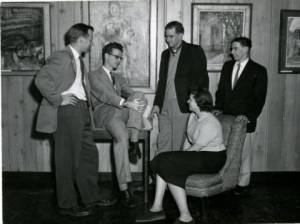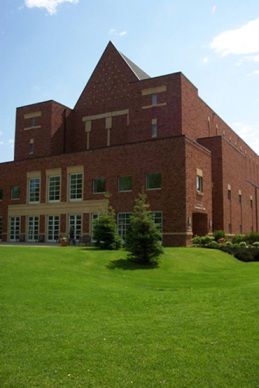There is neither Jew nor Gentile, neither slave nor free, nor is there male and female, for you are all one in Christ Jesus. (Galatians 3:28)
Since I arrived at Bethel in 2003, the phrases ?anti-racism? and ?racial reconciliation? have been prominent in campus discourse. Bethel leaders had identified a ?ministry of reconciliation? (in the context of ?sensitivity to the differences among people? and among peoples?) as an integral component of Christian higher education as early as 1968?s James Report on college objectives, and efforts to make the Bethel student body and faculty more racially diverse had been underway since the 1970s. But some ugly incidents in the 2000s seemed to suggest that Bethel still had a long way to go.

Bethel?s ?Cultural Council,? ca. 1958 ? Bethel University Digital Library
At the same time, I?ve long wondered if two other types of discrimination and inequality aren?t more prevalent, without receiving anything remotely like the attention given racism.
First, sexism. While it seems like the female-male ratio on the faculty is slowly coming into balance (e.g., three of our department?s six members are women, including the last two hires) and the dean of our College of Arts and Sciences, three other vice presidents, and our campus pastor are women, almost all of my female colleagues can also tell stories of being treated poorly by students ? of both sexes ? who view them as less deserving of respect than the men on faculty. Many of these colleagues have received comments on course evaluations suggesting that they are failing as wives and mothers by maintaining professional careers. Sadly, this kind of discrimination is often dressed up in biblical language and evangelical theology.
See the recent interview in Christianity Today with three Biola University professors whose research led them to conclude that women on the faculties of evangelical Christian universities like Biola and Bethel both perceive greater gender inequality and report higher job satisfaction than do their peers at secular universities. The authors explained the paradox partly by reference to a phenomenon they labeled ?benevolent sexism.? Then read reflections on this interview by my colleague Pamela Erwin, former chair of our Biblical and Theological Studies department and now an associate dean at Bethel.
While I?m glad to see more attention being given to the treatment of women and people of color on Christian college campuses, it also makes me realize how little I?ve heard us talk about a third potential inequality: that based on socioeconomic class.
This came to mind reading a recent piece in The Chronicle of Higher Education by historian Richard Greenwald, reflecting on those ? like himself ? who were the first in their families to attend college:
Too often these days, we in higher education simply aren?t doing enough to support the efforts of students who are the first in their families to attend college. These students, many of whom are working class, get brushed aside by concerns about budgets and enrollments, the sheer busyness of a college, their own passivity, and our assumptions that all students share similar experiences and preparation.
Noting that more than a quarter of these students last no more than one year, and almost 90% fail to graduate within six, Greenwald observed several unique challenges facing lower-income students who are the first in their families to continue their education: lack of social capital; an overly instrumental and transactional view of education; long work hours; complicated home lives; and a sense of shame about their roots and/or a feeling that they are betraying their background.
Moreover, one of the great virtues of a liberal arts education ? that it lets students encounter new ideas and helps them to think more critically about old ones ? also
makes you vulnerable and rootless for a while, something that is not a common blue-collar trait. In working-class communities, vulnerabilities may be seen as a sign of weakness that is to be avoided or at least hidden. Many first-generation students don?t know how to process such things as criticism of work they have done, and they respond by joking about it, ignoring it, or taking it personally.

Benson Great Hall ? Bethel University
I wouldn?t give up the disruptive effects of the liberal arts, but I have no doubt that Bethel ? a private university that charges rather high tuition and recently built a $30 million university commons featuring a lavish cafeteria, expensive grill, and coffee shop with on-staff baker ? could be an unsettling place for lower-income students for other reasons. We?re located on a wooded, lakeside campus far from the Twin Cities (and inaccessible by public transportation), which accords with the expectations of our suburban students who grew up spending weekends at wooded, lakeside cabins up north and who can simply drive their own car to Uptown Minneapolis or Grand Avenue in St. Paul if the ?Bethel bubble? is feeling too constricting. Subtly and not-so-subtly, I fear that we?re communicating that you need to be of (or act like you come from) a certain social background and level of prosperity to fit in at Bethel.
And I can see the ways in which lower-income students not only have to work long hours on top of what I ask them to devote to study, but are kept from participating in the kinds of enriching activities that we increasingly trumpet, particularly in the humanities. While there is no additional tuition for my upcoming travel course on World War I (one substantial benefit of Bethel?s ?J-term?), I?ve had several students regretfully inform me that they simply can?t afford the $3900 extra that each participant needs to spend in order to cover transportation to/within/from Europe, plus lodging, food, tours, museums, and other expenses. (In fact, it can be cheaper to spend a whole semester overseas, since some of our partner programs include all costs except airfare in the tuition.) And when, as department chair and academic advisor, I encourage more of our majors to pursue internships, I also have to recognize that few are paid. Those 150-200 hours represent hundreds, even thousands of dollars of potential income that some students can?t do without.
Still, it?s hard for me to know just how pervasive these problems are at a school like Bethel, or whether we do any better or worse than other private universities on this count.
Even at an institution that prizes close student-faculty relationships in which many of us choose to be fairly transparent about our faith, family, and other non-work aspects of our lives, not all students feel comfortable reciprocating. And much of what Greenwald identifies as resulting from a deficit in ?social capital? is easy to misread from the outside looking in:
Many don?t know how to debate without arguing, where the boundaries are in the classroom, and what behavior is appropriate. They may have poor time-management skills. Therefore they are perceived to be disrespectful, unfocused, and lazy when they really aren?t.
These, however, seem like problems that could face any private university; I don?t have any idea if they?re felt more, less, or equally keenly on Christian campuses than secular ones. I?d like to think that people who find their identity in Christ ? in whom, the apostle Paul taught, there is no difference based on race/ethnicity, class, and gender ? would do better than others on this count, but the surprising strength of racism and sexism (benevolent or otherwise) suggests that I should be less optimistic.
But it should be possible at least to gauge how welcoming evangelical colleges and universities are to students of lower income and/or working class backgrounds. More on that tomorrow?
In the meantime, I?d love to hear from readers (students, alumni, and employees of Christian colleges in particular): do you see racism, sexism, or classism prevailing at schools like Bethel? Are they more or less common in Christian higher education than other kinds of colleges and universities?
Source: http://pietistschoolman.com/2012/11/26/social-class-at-christian-colleges-part-1/
santa monica college wisconsin primary dallas fort worth airport texas tornados seattle seahawks new uniforms wisconsin recall wisconsin recall
No comments:
Post a Comment
Note: Only a member of this blog may post a comment.